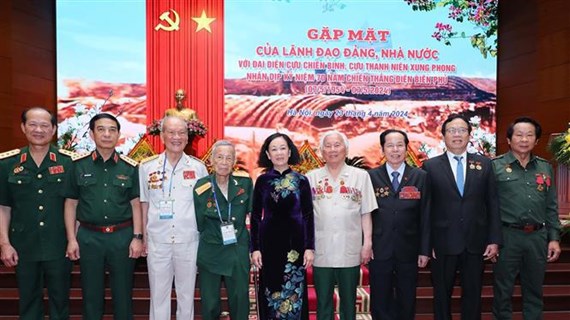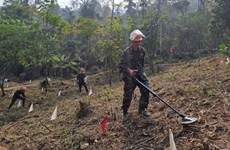Vietnam cares for disadvantaged groups
The State of Vietnam, with its humanitarian nature, has always offered
legal protection and applied preferential policies to disadvantaged
groups such as the disabled, women, children, the elderly and the poor.
The State of Vietnam, with its humanitarian nature, has always offered
legal protection and applied preferential policies to disadvantaged
groups such as the disabled, women, children, the elderly and the poor.
People with disabilities make up nearly 7 percent of the country’s 90 million population, many of them war victims. The National Assembly adopted the Ordinance on Persons with Disabilities in 1998 and passed the Law on Persons with Disabilities in 2010, plus an array of preferential policies to the groups in education, labour and other fields.
Thanks to such efforts, the disabled have enjoyed preferential treatment in their daily life, including transport and health care. Particularly, special schools have been open for children with disabilities while jobs generated for disabled women.
Vietnam is one of the countries that ratified the United Nations Convention on the Elimination of All Forms of Discrimination against Women at an early date. After five years implementing the Law on Gender Equality, adopted in 2006, the country had recorded remarkable achievements.
Vietnam ranked third in the Association of Southeast Asian Nations (ASEAN) in gender equality index in 2012.
Notably, the country has been listed in the group with a high percentage of female National Assembly deputies in the region and the world as a whole, second only to Laos in ASEAN and ranking 43th in the world.
At a recent seminar on the five-year implementation of the Law on Gender Equality, UN Resident Coordinator in Vietnam Pratibha Mehta praised Vietnam’s performance in enhancing gender equality and empowering women.
She laid a special emphasis on the need for relevant parties to take an active part in the work in a bid to bring more opportunities to women.
The State of Vietnam, together with the whole population, is currently making all-out efforts to eliminate gender and domestic violation, narrow gaps of employment, income and social status between men and women.
As a result, the number of women having access to healthcare services, cultural activities and information has been on a constant rise. The female literacy rate in the country is 92 percent and female students over 50 percent. Meanwhile, the rates of master’s and doctor’s degrees held by female are 30.53 percent and 17.1 percent, respectively.
The international community has praised Vietnam’s efforts in child protection, care and education. The country has by now basically completed the laws on children, creating a legal framework for the implementation of the State’s policies on the children. Many major programmes to ensure children’s rights have been successfully implemented, especially those on immunisation, health insurance, free health check-ups and treatment for under-six children, the universalisation of elementary and secondary education, and the development of pre-school education.
The group of children in special difficulty such as orphans, children with disabilities, children who are victims toxic chemicals and those infected with HIV/AIDS have received more attention of the State and the entire society.
The elderly in Vietnam have been cared for and protected under the Law on the Elderly (2010) and in accordance with the tradition of respect for the elderly. More and more old people nationwide have benefited from social allowances. People above 80 years of age without retirement pension and social insurance have got monthly allowances, health insurance and financial assistance for their funerals.
Besides, Vietnam has launched a range of programmes in support of the poor to help them get out of poverty, becoming a labour force not a social burden. The average income of poor households nearly doubled over the past five years. Many even have escaped from poverty and made a leap towards a new life.
Such assistance has been provided to not only the poor in the countryside but also poor students and low-income earners in urban areas as well as workers at industrial parks.
Recently, labourers’ rights have been ensured better under the Law on Employment (amended, 2012) and the Trade Union Law (2012).
According to a global report of the United Nations Development Programme (UNDP), Vietnamese human development index has increased by 41 percent over the past two decades. Vietnam is one of the over 40 developing countries having recorded more-than-expected achievements. The outcome has reflected the country’s determination to fulfill the goal of building a wealthy people, a strong country, an equal, democratic and civilised society.-VNA
People with disabilities make up nearly 7 percent of the country’s 90 million population, many of them war victims. The National Assembly adopted the Ordinance on Persons with Disabilities in 1998 and passed the Law on Persons with Disabilities in 2010, plus an array of preferential policies to the groups in education, labour and other fields.
Thanks to such efforts, the disabled have enjoyed preferential treatment in their daily life, including transport and health care. Particularly, special schools have been open for children with disabilities while jobs generated for disabled women.
Vietnam is one of the countries that ratified the United Nations Convention on the Elimination of All Forms of Discrimination against Women at an early date. After five years implementing the Law on Gender Equality, adopted in 2006, the country had recorded remarkable achievements.
Vietnam ranked third in the Association of Southeast Asian Nations (ASEAN) in gender equality index in 2012.
Notably, the country has been listed in the group with a high percentage of female National Assembly deputies in the region and the world as a whole, second only to Laos in ASEAN and ranking 43th in the world.
At a recent seminar on the five-year implementation of the Law on Gender Equality, UN Resident Coordinator in Vietnam Pratibha Mehta praised Vietnam’s performance in enhancing gender equality and empowering women.
She laid a special emphasis on the need for relevant parties to take an active part in the work in a bid to bring more opportunities to women.
The State of Vietnam, together with the whole population, is currently making all-out efforts to eliminate gender and domestic violation, narrow gaps of employment, income and social status between men and women.
As a result, the number of women having access to healthcare services, cultural activities and information has been on a constant rise. The female literacy rate in the country is 92 percent and female students over 50 percent. Meanwhile, the rates of master’s and doctor’s degrees held by female are 30.53 percent and 17.1 percent, respectively.
The international community has praised Vietnam’s efforts in child protection, care and education. The country has by now basically completed the laws on children, creating a legal framework for the implementation of the State’s policies on the children. Many major programmes to ensure children’s rights have been successfully implemented, especially those on immunisation, health insurance, free health check-ups and treatment for under-six children, the universalisation of elementary and secondary education, and the development of pre-school education.
The group of children in special difficulty such as orphans, children with disabilities, children who are victims toxic chemicals and those infected with HIV/AIDS have received more attention of the State and the entire society.
The elderly in Vietnam have been cared for and protected under the Law on the Elderly (2010) and in accordance with the tradition of respect for the elderly. More and more old people nationwide have benefited from social allowances. People above 80 years of age without retirement pension and social insurance have got monthly allowances, health insurance and financial assistance for their funerals.
Besides, Vietnam has launched a range of programmes in support of the poor to help them get out of poverty, becoming a labour force not a social burden. The average income of poor households nearly doubled over the past five years. Many even have escaped from poverty and made a leap towards a new life.
Such assistance has been provided to not only the poor in the countryside but also poor students and low-income earners in urban areas as well as workers at industrial parks.
Recently, labourers’ rights have been ensured better under the Law on Employment (amended, 2012) and the Trade Union Law (2012).
According to a global report of the United Nations Development Programme (UNDP), Vietnamese human development index has increased by 41 percent over the past two decades. Vietnam is one of the over 40 developing countries having recorded more-than-expected achievements. The outcome has reflected the country’s determination to fulfill the goal of building a wealthy people, a strong country, an equal, democratic and civilised society.-VNA












